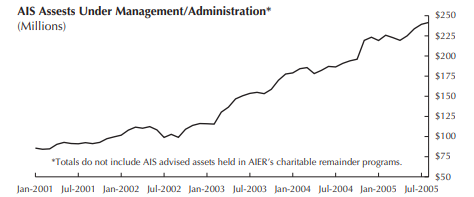“You make more money selling advice than following it. It’s one of the things we count on in the magazine business—along with the short memory of our readers.” —Steve Forbes, Forbes Magazine, The Anderson School, University of California at Los Angeles, April 19, 2003.
We appreciate Mr. Forbes’ candor. He is correct; it is easy to make money by peddling advice and hopping from one hot investment notion to the next. We, too, are in business to earn money, though our approach is decidedly different from that of most financial publishers. Asset class investing, though not terribly exciting, is tried and true, and there is a growing awareness among the investing public that a structured, passive approach is by far the most rational approach to building wealth. We are content to prosper patiently in this environment, by gradually building our subscriber and client base. We do not lose sleep over those who part ways in order to seek the wisdom of the latest market guru.
The chart below depicts the growth of the assets we manage or administer for individuals and institutions:

Contrary to Mr. Forbes’ suggestion, we do follow our own investment advice, and we have no regrets. The chart above does not include the $127 million in assets we advise that are held in trust in the charitable remainder programs of our parent, the American Institute for Economic Research (AIER).
For these programs, we utilize the same eight asset classes that we recommend for our readers. Donors and AIER alike have benefited from our approach. A donor can name beneficiaries who receive payments of income for life. No capital gains taxes are due when donated assets are sold and reinvested and the donor can take a charitable deduction for the actuarially calculated present value of the eventual remainder. AIER has been able to fund its educational mission in part through the receipt of assets upon the death of the last beneficiary named. Many other charitable and educational institutions raise funds by offering programs with the same tax advantages, but we are not aware of any others that follow the investment strategy recom mended by AIS.
There are few restrictions on the type of appreciated asset that may be donated. In fact, these programs might be well- suited to investors with appreciated real estate, who find they are “land rich” but “income deprived.” For more information regarding AIER’s programs, contact Mr. Shaun Buckler, CFO, (413) 528-1216 ext. 3146, sbuckler@aier.org
Also in This Issue:
REITs: A Valuable Portfolio Component
A New Way to Access Micro-Cap Stocks: Exchange-Traded Funds
The High-Yield Dow Investment Strategy
Recent Market Statistics
The Dow-Jones Industrials Ranked by Yield
To access the full article, please login or subscribe below.
Already a Subscriber?
Log in now
Subscribe Today
Get full access to the Investment Guide Monthly.
Print + Digital Subscription – $59/YearIncludes 12 Print and Digital Issues
Print + Digital Subscription – $108/2 Years
Includes 24 Print and Digital Issues
Digital Subscription – $49/Year
Includes 12 Issues
Digital Subscription – $98/2 Years
Includes 24 Issues

